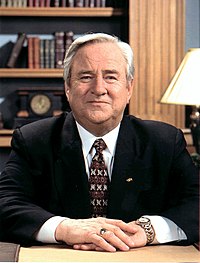Jerry Falwell
Jerry Falwell (Lynchburg, 11 de agosto de 1933 — Lynchburg, 15 de maio de 2007) foi um pastor batista, televangelista e ativista conservador.
| Jerry Falwell | |
|---|---|
| Nascimento | 11 de agosto de 1933 Lynchburg |
| Morte | 15 de maio de 2007 (73 anos) Lynchburg |
| Sepultamento | Virgínia |
| Cidadania | Estados Unidos |
| Filho(a)(s) | Jonathan Falwell, Jerry Falwell, Jr. |
| Alma mater |
|
| Ocupação | pregador, escritor de não ficção, figura pública |
| Religião | Igreja Batista |
| Causa da morte | arritmia cardíaca |
Biografia editar
Jerry Falwell nasceu em 1933 em Lynchburg.[1] Em 1952, ele experimentou um novo nascimento e estudou no Bible Baptist College em Springfield, Missouri.[2]
Ministério editar
Em 1956, ele fundou a Thomas Road Baptist Church, uma megaigreja em Lynchburg.[3] No mesmo ano, ele fundou o "Old Time Gospel Hour", um programa transmitido no rádio e na televisão ("Thomas Road Live" desde 2007). Ele também fundou escolas primárias e lares para mães solteiras e alcoólatras, além de Liberty University em Lynchburg, em 1971.[4]
Em 1979, ele fundou a "Maioria Moral", uma organização política que reúne católicos, protestantes e evangélicos.[5] Tinha até 6,5 milhões de membros e ajudou a eleger Presidência dos Estados Unidos de Ronald Reagan, e mais tarde de George W. Bush.[6]
Em 1996, ele se tornou um membro da Convenção Batista do Sul, embora permanecesse afiliado à Comunhão Batista Bíblica Internacional.[7]
Prêmios editar
Jerry Falwell foi o primeiro não-judeu a receber o Jabotinsky Medal em 1980, do primeiro-ministro de Israel por sua amizade com o estado judeu.[8]
Falwell recebeu três doutorados honorários: Doutor em Teologia pelo Tennessee Baptist Seminary, Doutor em Letras pela California Graduate School of Theology e Doutor em Direito pela Central University em Seul, Coréia do Sul.[9]
Controvérsias editar
Em 1989, ele disse aos funcionários da Universidade Liberty que ser membro de sua igreja e pagar o dízimo eram obrigatórios. [10]
Falwell ficou conhecido internacionalmente entre 1998 e 1999, ao denunciar Tinky Winky, uma das personagens dos Teletubbies, como sendo um símbolo gay, já que o criador da personagem era homossexual. Causou polêmica também ao defender o apedrejamento como punição para o adultério e o retorno da escravidão.[11]
Livros editar
- Church Aflame. Impact, 1971.
- Capturing a Town for Christ. Revell, 1973.
- Liberty Bible Commentary on the New Testament. Thomas Nelson, 1978.
- Listen, America! Doubleday, 1980.
- The Fundamentalist Phenomenon. Doubleday, 1981.
- Finding Inner Peace and Strength. Doubleday, 1982.
- Liberty Bible Commentary. Thomas Nelson, 1982.
- When it Hurts Too Much to Cry. Tyndale House, 1984.
- Wisdom for Living. Victor Books, 1984.
- Stepping Out on Faith. Tyndale House, 1984.
- Champions for God. Victor Books, 1985.
- If I Should Die Before I Wake. Thomas Nelson, 1986.
- The Fundamentalist Phenomenon/the Resurgence of Conservative Christianity. Baker Book House, 1986.
- Strength for the Journey. Simon & Schuster, 1987.
- The New American Family. Word, 1992.
- Falwell: An Autobiography. Liberty House, 1997. (Ghost written by Mel White [1])
- Fasting Can Change Your Life. Regal, 1998.
- Achieving Your Dreams. World Publishers, 2006.
- Building Churches of Dynamic Faith: A Five-Session Study Guide. World Publishers, 2006.
- Dynamic Faith Journal. World Publishers, 2006.
Notas e referências editar
- ↑ Robert H. Krapohl, Charles H. Lippy, The Evangelicals: A Historical, Thematic, and Biographical Guide, Greenwood Publishing Group, USA, 1999, p. 239
- ↑ Frank J. Smith, Religion and Politics in America: An Encyclopedia of Church and State in American Life [2 volumes], ABC-CLIO, USA, 2016, p. 295
- ↑ Mark Ward Sr., The Electronic Church in the Digital Age: Cultural Impacts of Evangelical Mass Media , ABC-CLIO, USA, 2015, p. 283
- ↑ George Thomas Kurian, Mark A. Lamport, Encyclopedia of Christian Education, Volume 3, Rowman & Littlefield, USA, 2015, p. 738
- ↑ Samuel S. Hill, The New Encyclopedia of Southern Culture: Volume 1: Religion, University of North Carolina Press, USA, 2006, p. 1977
- ↑ Brian Steensland, Philip Goff, The New Evangelical Social Engagement, OUP USA, USA, 2014, p. 111
- ↑ Timothy J. Demy Ph.D., Paul R. Shockley Ph.D., Evangelical America: An Encyclopedia of Contemporary American Religious Culture, ABC-CLIO, USA, 2017, p. 151
- ↑ Paul Charles Merkley, Christian Attitudes towards the State of Israel, McGill-Queen's Press - MQUP, Canada, 2001, p. 202
- ↑ Randall J. Stephens, Karl Giberson, The Anointed: Evangelical Truth in a Secular Age, Harvard University Press, USA, 2011, p. 224-225
- ↑ Associated Press, Falwell Mandates Tithing and Church Membership for All of His Employees, latimes.com, USA, 11 de março de 1989
- ↑ «Quem escreveu a Bíblia?». Revista Abril Superinteressante. Dezembro de 2008. Consultado em 22 de abril de 2015.
Líderes como o pastor Jerry Falwell defendem o retorno da escravidão e o apedrejamento de adúlteros
Ligações externas editar
- «Site officiel de Jerry Falwell Ministries» (em inglês)
- «Liberty University» (em inglês) – Jerry Falwell, Chancellor
- «The National Liberty Journal» (em inglês) – Jerry Falwell, Publisher
- «Rev. Falwell's ProCon.org Biography» (em inglês)
- «SourceWatch – Jerry Falwell» (em inglês)
- «Jerry Falwell News from I Hate Pat Robertson» (em inglês)
- «Falwell and Above» (em inglês)
- «Internet Movie Database» (em inglês)
- «Jerry Falwell at the Notable Names Database» (em inglês)
- «Jerry Falwell's connection to Reverend Sun Myung Moon» (em inglês)
- «ESPN – A night of hoops with Jerry Falwell» (em inglês)
- «An NPR: Jerry Falwell timeline.» (em inglês)
- «Discours : « Nuclear Weapons are Morally Indefensible »» (em inglês), Oxford Union debate, 1º de março de 1985
- «« Jerry Falwell, Leading Religious Conservative, Dies at 73 »» (em inglês), New York Times, 15 de maio de 2007
